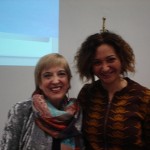Rebecca Oxford on Learning (war) & Strategy Training (tactics to win)
“What do these images have in common?” asked Rebecca Oxford in her presentation “Help Your Students Become Better Learners; Understanding, Assessing and Teaching Language Learning Strategies” given as a part of Yeditepe University Graduate Seminars on 7th March 2011 in Istanbul-Turkey. An astronaut walking on the moon, an airplane breaking the sound barrier, and a rider jumping over a barrier…We responded that in each picture there was a confrontation of a challenge. In other words people were taking steps towards a goal. Then she explained that “strategy” in ancient Greece meant steps to win a war. Then there were tactics which were smaller than a strategy but also aiming towards achievement of goals. Yes! That’s it! I often had that mental image that teaching-learning is like a war. Students encounter a cognitive or affective difficulty in learning and as teachers we try to provide them with strategies to cope with barriers in learning. Rebecca differentiated between instructional strategies and learning strategies and defined learning strategies as: “broad, goal-directed actions consciously employed by the learner for the purpose of reaching certain language learning goals or overcoming language learning barriers”. Teachers are in charge of instructional strategies and students are/should be in charge of learning.
“why should we pay attention to learning strategies?”
When she asked this question I thought about my own teaching; how much time do I allocate for this? Do I focus on strategy training consistently and timely? I wholeheartedly believe that they are of vital importance and it was really very good to be reminded of research findings in this presentation.
- Strategy Inventory for Language Learning Research (Oxford, 1990) acknowledges that strategies are linked to proficiency and there are correlations among strategies and language proficiency on varying degrees, .30 to .73. In other words SILL predicts proficiency.
- Students’ use of strategies is significantly related to motivation. Students who have different strategies for attaching a text (war) will find a way to finish a given task.
- Strategies increase students’ belief that they can achieve a goal or task-self-efficacy
Language Learning Dimensions and Strategies in Each Dimension
Oxford’s Strategic Self-Regulation Model suggests students to take greater charge of their own learning. Cognition helps learners process information and build schemata-background knowledge, affect helps learners to control emotions and motivations and socio-cultural interactive dimension help learners to learn through interactions and deal effectively with culture and identity.
One of the criticisms raised was that educational pschology places much more emphasis on cognitive domain. For effective learning to take place these 3 dimentions need to interplay with eachother.
A new point of view
It is often argued that there are meta-cognitive strategies (paying attention, evaluating, monitoring…etc.). Rebecca Oxford argues that these also deal with affective and socio-cultural and could be applied in all 3 domains- not only cognitive!. Therefore she suggests the term “meta-strategy” instead which is a large enough term to embrace cognitive, affective and socio-cultural interactive learning dimensions.
How do you assess learning strategies?
Many strategies were mentioned including;
- Think-aloud (you verbalize what’s going on in your mind during the task)
- Think-after (reflecting upon strategies in use after the task)
- Personal or group interviews
- Diaries
- Learning logs
- Observations strategy questionnaires (SILL, LSS; MARSI, SORS, MALQ)
The most important awakening point for me was that I realized I hardly use these assessment techniques for strategy use. I usually remain at the first phase of learner training which is introducing. I probably thought; “well, there is no time- the course is packed!” or “well they haven’t been involved in reflective activities such as these and now it is very difficult to start now”. But after-effects of this presentation hit me. I really believe that teaching and evaluating strategies are very important for education and decided to make something about this in daily operations.
How do you teach learning strategies?
Many suggestions were raised such as direct strategy instruction embedded in language teaching and learner guidebooks but I would like to prioritize and pick on one: color-coding of strategies. To do this first teacher classifies the strategies and associates each with a color. For instance in a reading lesson “focusing on key words to find the main idea” is red, and “looking at examples to find the main idea” is blue. Then students are asked to put a color post-it when they made use of that strategy.
I really enjoyed the presentation and it made me think about my own strategies in learning and the really good teachers I had (thank you, thank you, thank you…) and really good learning situations they created for me. It was good to hear about different learning strategies that are used and I am looking forward to Rebecca Oxford’s new book.




Dear Asli,
This is a wonderful blog. You captured all of my key ideas and probably said them even better than I did!
I am deeply grateful that you attended the lecture. I know your students will benefit from you and your understanding of strategies.
Hope to see you again in Turkey. Your country is absolutely amazing, and Cliff and I loved it. If you come to the U.S., let me know!
Warmest wishes,
Rebecca Oxford
Dear collegues,
I am really surprised of seeing this blog and comments about Rebecca Oxford and her conference. Asli, you are so lucky to meet her and exchange information about learning strategies and teaching experience. I wish some day I can do so. I’m a venezuelan professor investigating about this subject. I would like to know more about Oxford’s congresses and seminars around the world. Let me know, please.
Hello, it is so nice to hear that you visited my blog. I will keep you updated about seminars.
Kind regards,
asli
Dear Asli,
Thank You for Your great comment!
I’ m so happy that I found Rebecca Oxford’s wonderful “Teaching and Researching: Language Learning Strategies” -publication!
I really appreciate and agree with Oxfird’s new point of view about metastrategies. I will introduce the idea in my research.
Best regards, Maiju Vepsäläinen, Finland
Dear Maiju,
It’s great to hear that you liked my post. I also think that explicit instruction of meta-strategies make a great difference. I am very curious about your research now… 🙂 Good luck with it.
Kind regards,
asli
hello Ms. Asli! I’m an English teacher here in the Philippines. I found your blog, and I’m so glad you actually know Ms. Rebecca Oxford! =) I’m doing my thesis for my Master’s Degree, and I’d like to use Ms. Oxford’s SILL as my instrument.
May you help me contact Ms. Oxford? I’d like to get her permission to use SILL for my thesis.
I really hope you can help me with this. PLEASEEEEEEEEEEEEEE…..
Thank you!
Sincerely,
Irene Bansuing
Hello Irene,
I met Mrs. Oxford in a conference in Istanbul. She is really an inspiring person. I think that it could be a good idea to e-mail her about your research project. If you google-search her name I am sure that you will find her e-mail. I wish you all the best with your research and hope that you share the results.
Kind regards. 🙂
This is a lovely blog Asli! Thank you for inspiring us!
Hi Asli, my professor has just suggested me that i need to check Rebecca’s book to learn more about her metacognitive strategies!
What is the name of the book in which she gives strategies to improve metacognitive learning? my research is on digital literacies, and i plan to focus on improving metacognitive strategies of the students! Thank you so much,
Tuba Angay-Crowder
Hello, thanks a lot for your kind comment. Thanks for stopping by 🙂
Dear Tuba,
I think your research topic is really very interesting and I wish you all the best with it. However, I don’t know the title of the book that could help you. Please let me know if I could help you with anything else. Kind regards, Asli.
Thanks for the mention of my blog in your Pearltrees 🙂